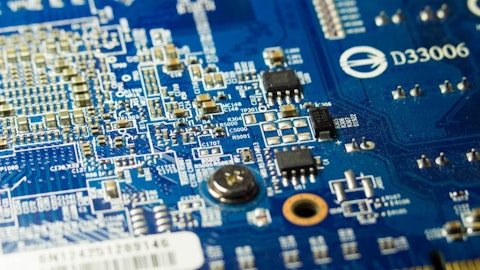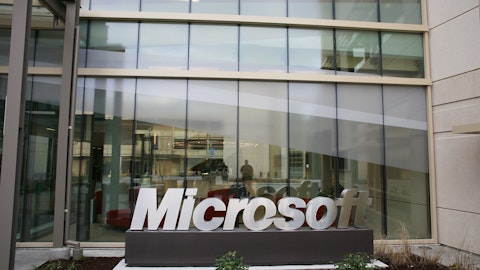In this article we take a look at Maverick Capital’s Lee Ainslie’s top 10 stock picks. You can skip our detailed analysis of Ainslie’s investment strategy and some interesting bits from his investor letters and go to Billionaire Lee Ainslie’s Top 5 Stock Picks.
Lee Ainslie is an American value investor and hedge fund manager who founded Maverick Capital in 1993. The fund has over $6 billion in managed securities as of the end of 2020. Ainslie is a Tiger cub – protégé of the legendary investor and billionaire Julian Robertson – having worked at Robertson’s hedge fund for years before starting Maverick at the age of 28 with $38 million, funded by American business magnate Sam Wyly.
Lee Ainslie’s Investment Strategy
Ainslie is a value investor who picks long positions in stocks with strong value and likes to hold them. In 2020, Maverick Capital reportedly gained 16.3%. From 1995 through 2014, Maverick returned 13% annually.
The 56-year-old hailing from Virginia usually avoids investing in currencies, bonds and commodities. He believes in traditional stock-picking strategies, investing only in equities and maintaining a balance of long and short positions.
It was recently reported that Maverick raked in big profits amid the GameStop episode as the fund had a major stake in the company.
In his Q3’20 letter to investors, Ainslie said that Maverick Capital “enjoyed a strong third quarter” during a volatile market situation.
The Wonders of ‘Old-Fashioned’ Stock Picking
In his second-quarter 2020 letter, Ainslie said that even though Maverick Fund USA had its “strongest quarter in the fund’s history,” the performance in the first 10 weeks of the quarter was “lackluster” as the fund captured only 22% of the market’s gain. The investor said this was because his hedge fund’s long portfolio has been “biased” towards businesses that it believes are set for long-term gains, while its short positions are on “structurally challenged” businesses.
Ainslie said that Maverick Fund’s performance after the initial 10 weeks was extremely strong, thanks in part to the timing and the fund’s portfolio exposure. But the primary reason for this strong performance, according to Ainslie, was just “old-fashioned stock picking.”
Big profits for Maverick came in the quarter as one of its short positions paid off. Ainslie said that one of his long-held short positions on a company he believed was a fraud paid off as the stock crashed 95%.

Lee Ainslie of Maverick Capital
The Importance of Value Investing
Talking about ROIC for cheap and value stocks and comparing their performance to high-growth stocks, Ainslie said that the current volatility in the market and “dramatic factor swings” are increasing the importance of structuring a portfolio that is based on fundamentals of individual companies instead of beta or other factors. He said that the market continues to face “extreme uncertainties” amid the pandemic.
Ainslie also said that he believes this volatile and uncertain environment will be “very rewarding” to the investors who base their decisions on fundamentals and secular trends rather than companies’ guidance and temporary factors.
‘Ominous Economic Signals’
In his second-quarter of 2019 investor letter, Ainslie said that Maverick Capital’s performance was “weak” amid disappointing performance on the long side. Talking about the rising volatility in the financial markets, Ainslie said that despite the “ominous economic signals” deep analysis of the underlying movements and valuations of market risk factors shows a consistent cross-asset signal with equity investors showing clear preference for a defensive profile. He said that unlike the tech bubble of 2000, low volatility stocks today (Q2’19) are “incredibly expensive” as investors have crowded into rate-sensitive securities.
Ainslie at that time pictured two scenarios. The bullish scenario assumed that the Federal Reserve would be successful with its insurance cuts and the Chinese fiscal and monetary stimulus would reverse its slowdown and the trade war between the US and China would end. The outcome of this scenario, according to the hedge fund manager, was rising interest rates and steepening of the yield curve.
Ainslie’s frank letters to investors show how difficult it has become for the smart money to beat the market. Even the so-called investing gurus are struggling to understand the changing dynamics. The hedge fund industry’s reputation has been tarnished in the last decade, during which its hedged returns couldn’t keep up with the unhedged returns of the market indices. On the other hand, Insider Monkey’s research was able to identify in advance a select group of hedge fund holdings that outperformed the S&P 500 ETFs by more than 88 percentage points since March 2017. Between March 2017 and February 5th 2021 our monthly newsletter’s stock picks returned 187.5%, vs. 75.8% for the SPY. Our stock picks outperformed the market by more than 111 percentage points (see the details here). We were also able to identify in advance a select group of hedge fund holdings that significantly underperformed the market. We have been tracking and sharing the list of these stocks since February 2017 and they lost 13% through November 16. That’s why we believe hedge fund sentiment is an extremely useful indicator that investors should pay attention to. You can subscribe to our free newsletter on our homepage to receive our stories in your inbox.
Let’s start our list of billionaire Lee Ainslie’s top 10 stock picks.
10. Amazon.com, Inc. (NASDAQ: AMZN)
Value: $168,911,000
Percent of Lee Ainslie’s 13F Portfolio: 2.7%
Number of Hedge Fund Holders: 273
Amazon ranks 10th on the list of Lee Ainslie’s top 10 stock picks. Amazon shares have gained about 60% over the last 12 months. The company has been one of the biggest beneficiaries of the coronavirus crisis as ecommerce sales grew following stay-at-home orders. In the fourth quarter, the company posted EPS of $14.09, way ahead of the Street’s forecast of $7.23 per share. Revenue in the quarter came in at $125.56 billion, compared to the consensus of $119.7 billion. The company recently opened a cashier-less grocery store in London, its first international store having the automated technology that would allow customers to allow queues.
As of the end of the fourth quarter, 273 hedge funds in Insider Monkey’s database of 887 funds held stakes in Amazon, compared to 245 funds in the third quarter. Lee Ainslie’s Maverick Capital owns 51,862 shares worth $1.1 billion. Amazon ranks 1st in our list of the 30 Most Popular Stocks Among Hedge Funds: 2020 Q4 Rankings.
9. Alibaba Group Holding Limited (NYSE: BABA)
Value: $216,219,000
Percent of Lee Ainslie’s 13F Portfolio: 3.5%
Number of Hedge Fund Holders: 156
Alibaba ranks 9th on the list of Lee Ainslie’s top 10 stock picks. Alibaba shares are up by 14% over the last 12 months. Tensions between Alibaba’s CEO Jack Ma and the Chinese government are rising. Financial Times recently reported that Ant Financial, in which Alibaba has a major stake, refused to give full access to consumer credit data asked by Chinese banks. Clash between Ma and Chinese authorities started last year after the billionaire grilled China’s central banks for being too strict and reportedly called them “pawn shops.” Alibaba’s Ant Group had to call off its IPO plans following the Chinese government’s pressure. The group is reportedly exploring a solution to allow employees monetize shares after the pulled IPO.
According to our database, the number of BABA’s long hedge funds positions decreased at the end of the fourth quarter of 2020. 156 hedge funds hold a position in Alibaba by the end of December, compared to the 166 funds in the third quarter. The company’s biggest stakeholder is Fisher Asset Management, with 13.9 million shares worth $3.2 billion. Alibaba ranks 7th in our list of the 30 Most Popular Stocks Among Hedge Funds: 2020 Q4 Rankings.
Miller Value Partners, in their Q4 2020 Investor Letter, said that Alibaba Group Holding Limited (NYSE: BABA) was a top detractor for their portfolio in the fourth quarter of 2020.
Here is what Miller Value Partners has to say about Alibaba Group Holding Limited in their Q4 2020 investor letter:
“Alibaba (BABA) had quite the quarter rising up to a high of $317 in October only to end the quarter down 20% after the delay of the Ant IPO and the announced investigations by the Chinese government into monopolistic practices at the firm. There was additional pressure on the stock as the US House of Representatives passed a bill that threatens to delist Chinese companies from US exchanges unless US regulators are able to inspect their financial audits within three years. During the quarter, the company increased their share buyback program from $6B to $10B. The company report second quarter FY21 results that were largely in-line with expectations. The company reported revs of Rmb155.1B (USD 23.9B) slightly beating consensus of Rmb 153.9B (USD 23.7B) and adjusted EBITDA of Rmb 47.5B (USD 7.3B) versus 41.3B (USD 6.3B). The company maintained full year guidance for revenues of Rmb 650B (USD 100.3B).”
8. Alphabet Inc. (NASDAQ: GOOG)
Value: $252,332,000
Percent of Lee Ainslie’s 13F Portfolio: 4%
Number of Hedge Fund Holders: 157
Lee Ainslie increased his hold in Alphabet by 8% in the fourth quarter, ending the period with $252.3 million worth of the company’s shares. The company recently said it will partner with Intel to develop reference architectures and integrated solutions to allow communication companies launch 5G and edge network solutions faster. GOOG shares are up 61% over the last 12 months.
There were 157 hedge funds in our database that held stakes in Alphabet Inc. at the end of the fourth quarter, compared to 150 funds in the third quarter.
7. FLEETCOR Technologies, Inc. (NYSE: FLT)
Value: $267,247,000
Percent of Lee Ainslie’s 13F Portfolio: 4.3%
Number of Hedge Fund Holders: 44
Atlanta, Georgia-based FleetCor’s technology helps businesses accept, digitize, secure and automate payments. The company’s shares are up by 20% over the last 12 months. In the fourth quarter, FleetCor posted adjusted EPS of $3.01, beating the Street’s forecast by $0.19. Revenue in the quarter declined 11% to $617.33 million but surpassed the consensus forecast by $12.74 million. Earlier this year, the company bought Cloud-based accounting software Roger.
As of the end of the fourth quarter, 44 hedge funds in Insider Monkey’s database of 887 funds held stakes in FLT, compared to 40 funds in the third quarter. Viking Global is the company’s most significant stakeholder, with 2.3 million shares worth $619.3 million.
6. Lam Research Corporation (NASDAQ: LRCX)
Value: $267,800,000
Percent of Lee Ainslie’s 13F Portfolio: 4.3%
Number of Hedge Fund Holders: 56
California-based Lam Research ranks 6th on the list of Lee Ainslie’s top 10 stock picks. The company makes various semiconductor technologies like transistors, pattering, interconnect, photonics, sensors and discrete signaling solutions. Lam Research shares have gained about 80% over the last 12 months. BofA recently gave bullish comments about the stock, along with several other semiconductor companies, citing a shortage of semi fabs in the market and increasing demand worldwide.
With a $452.2 million stake in Lam Research Corp., Ken Fisher’s Fisher Asset Management owns 957,559 shares of the company as of the end of the fourth quarter of 2020. Our database shows that 56 hedge funds held stakes in LRCX at the end of the fourth quarter, versus 55 funds at the end of the third quarter.
Click to continue reading and see Billionaire Lee Ainslie’s Top 5 Stock Picks.
Suggested articles:
- 10 Best Precious Metals Stocks To Buy
- 11 Best Natural Gas Stocks To Buy Now
- 10 Best Junior Gold Mining Stocks To Buy
Disclosure: None. Billionaire Lee Ainslie’s Top 10 Stock Picks is originally published on Insider Monkey.




